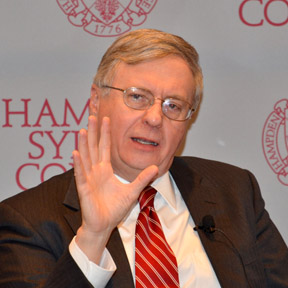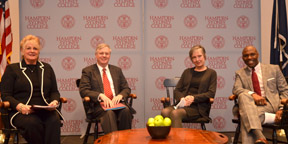Wabash College President Patrick E. White joined with presidents of two other single-sex colleges in a two-day symposium at Hampden-Sydney College in Virginia. “College Men: Making the Grade?” examined the so-called “male crisis” in education through presentations from scholars, faculty, and Hampden-Sydney students regarding research and opinion on men’s education.
On Wednesday’s panel session President White joined his host, Dr. Christopher B. Howard, president of Hampden-Sydney College, and Dr. Jo Ellen Parker, president of Sweet Briar College. Dr. Jennifer L. Braaten, president of Ferrum College, moderated the talk.
 “The story of self-making and self-construction that goes into making a Wabash man or a Hampden-Sydney man remains not only viable but necessary for the nation,” President White said. “That story may have been, at times, a story of privilege, but it has always been a story of change, growth, and development.
“The story of self-making and self-construction that goes into making a Wabash man or a Hampden-Sydney man remains not only viable but necessary for the nation,” President White said. “That story may have been, at times, a story of privilege, but it has always been a story of change, growth, and development.
“No one arrives at our colleges fully formed as a mature and grown-up person. We are always developing and leading young men to adulthood.”
The symposium included discussions on and analysis of the much publicized “boy crisis” and “male crisis” in education. Alumni professors at Hampden-Sydney also reflected on their experiences as undergraduates at the all-male college and how that helped (or hindered) their effectiveness teaching there today.
The symposium ended with a keynote talk by Dr. Bryant Marks, a scholar from Morehouse College (another men’s college), who outlined effective student-centered approaches to educating men in college.
Uniquely positioned in this discussion because he has spent 18 years as a senior academic leader at Saint Mary’s College (Notre Dame, Indiana), a women’s college, before coming to Wabash, President White told the audience that he believes the country not only needs good single-sex colleges, it needs those colleges to share their expertise in educating men differently.
“In a culture that is not taking young men seriously, especially young men removed from the power elites, Wabash offers young men the promise that their lives and greatest ambitions matter. We will take you seriously. As long as education means more than the accumulation of credits and is the growth of the whole person, there is a need for what we do. We consider a Wabash education to be a challenging and transformative experience that says, ‘Young man, you can be a hero in your own life; you are not now what you can become. This college experience will change your life.’”
Dr. White acknowledged that this kind of student-centered, rigorous approach is not for everyone — especially at a time when the average male college student spends 41 hours a week watching television or playing video games.
“Some will shy away from this kind of educational experience because it is hard and wrenching at times,” Dr. White said. “But for those who do, the world will be different. The focus on the development of what it means to be man or a woman can be more concentrated and clear in a single sex environment.”
Dr. Howard of Hampden-Sydney also talked about the need to grow single-sex education at the secondary level and stressed the need to communicate the positive aspect of men’s colleges and women’s colleges to a larger world, a world that wants the qualities these institutions nurture so effectively: seriousness of purpose, high ambition, self-reliance, and the desire to be constantly growing and developing.
Dr. Jo Ellen Parker, President of Sweet Briar, noted that women’s colleges developed in a world where women were denied access to higher education generally, especially to excellent higher education. Today, when more women than men are attending College, the issue of access to excellent education remains relevant. Women still are underrepresented in corporate and political leadership, so the empowering action of women’s colleges still has an important place in national and global life.
Dr. White added, “Certain conversations are more possible in a single sex environment; conversations of affections and loyalty, of heroism and meaning in one's life, of true ambitions are readily voiced and go in particular directions of candor and challenge in a single sex environment. The focus on development and empowerment is clearer and we can call young men to their highest ambitions in every aspect of their lives.”
 President White said that symposia like this are important and must continue, and he applauded Dr. Howard for raising the level of dialogue on single-sex education.
President White said that symposia like this are important and must continue, and he applauded Dr. Howard for raising the level of dialogue on single-sex education.
While visiting Hampden-Sydney, President White had the opportunity to meet and dine with students, administrators, and even members of H-SC’s Board of Trustees. “We had many discussions about the nature of fraternity life, the role of athletics, and other issues on campus. We have solidified our friendship and our connection between our two schools, and we look forward to further collaboration to mutual benefit.”
President White often challenges Wabash men to become heroes in their own lives; to write their own stories of accomplishment and success. That theme came through during one of the symposium’s student presentations.
“Devin Baker, a sophomore, noted that the brotherhood of H-SC ‘raises heroes through the power of friendship,’” Dr. White said. “I referenced this in my remarks that evening because this resonates so powerfully with my message to Wabash students. When I tell freshmen that their fellow students will be among their best teachers, both the ambition of heroism and the collaborative learning of the community, team, and brotherhood come together.”